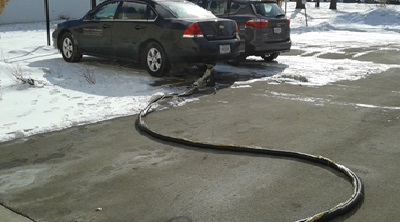PI: WILL NORTHROP, GRADUATE STUDENT: HUZEIFA BADSHAH
Gasoline engines are shifting from the widely used port fuel injection (PFI) engine towards gasoline direct injected (GDI) engine for fuel economy benefits, however GDI engines are known to have higher particle emissions than PFI engines.

Particle emissions can vary due to various factors such as engine operating condition and weather conditions. Engine start-up in cold weather conditions can be a significant source of harmful particle emissions. Engines usually burn rich (using significant fuel enrichment) to ensure a proper start during such conditions. In GDI engines this leads to liquid fuel droplets impinging on the cold surfaces of the combustion chamber and thus cause higher soot/particle formation. This study characterizes solid (mainly elemental carbon) as well as semi-volatile (organic) particle number and size distributions during "Cold-Cold Start" from light duty vehicles. A total of 30 vehicles, which included PFI, GDI, and Diesel with diesel particulate filters (DPF) were tested during the winter months of 2015. Emissions were sampled from the vehicles upon starting after an overnight soak. The average ambient temperature during the start-up tests were -17 ± 2 °C. With these tests we hope to show that using a particulate filter in the exhaust system, as employed by post 2007 diesel vehicles can have a significant impact on particle emissions.